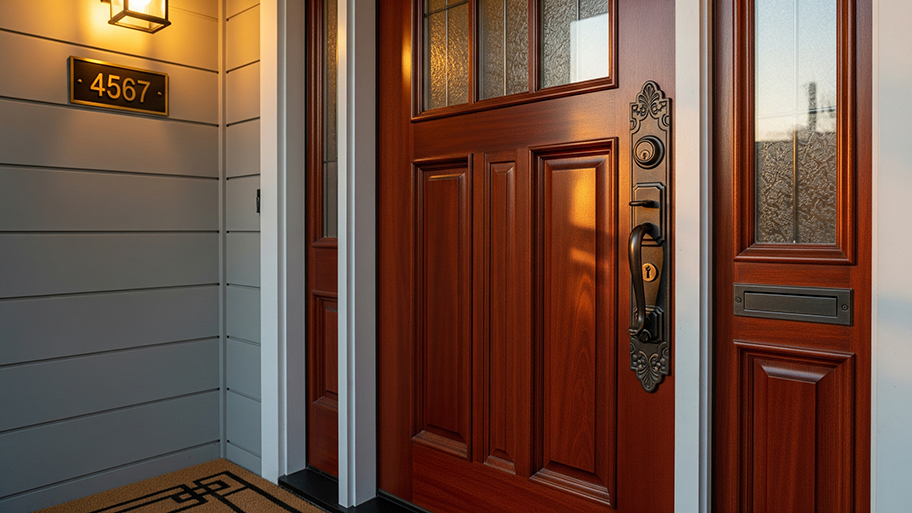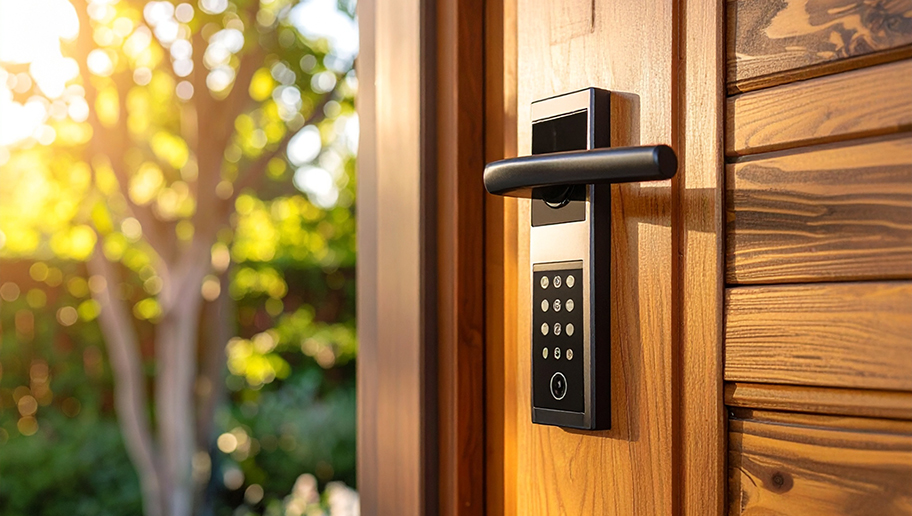
Wondering how much a locksmith costs? Discover locksmith prices, key cost factors, and tips to save on home lockout, rekeying, and installation services.
Locksmith service costs depend on your project and location. Check with a local pro for your specific job.
Lock replacement involves removing old locks and installing new ones for improved security or function.
The cost depends on factors like lock type, security features, labor rates, and emergency service charges.
Locksmiths charge $50 to $120 per hour, with most requiring a minimum charge of $40 to $75.
Upgrading to advanced locks can offer a strong return on investment through better security and increased home value.
Replacing locks helps protect your family and belongings, and can bring peace of mind after moving or a security breach.
This article was created using automation technology and thoroughly fact-checked and edited by an Angi Editor in accordance with our AI policy.
Lock replacement costs an average of $150, with most homeowners spending between $60 and $350 per lock. Prices vary based on lock type, security features, and labor. Standard doorknob replacements are less expensive, while smart or high-security locks cost more. Understanding these factors helps you budget for your next lock replacement.
Let’s explore the factors that affect lock replacement cost, from the number of locks to advanced features, so you can make an informed choice for your home security.
The number of locks you need to replace will have a direct impact on your total project cost. Replacing a single lock, such as a front door deadbolt, is less expensive than changing every lock on your property. Costs per lock may decrease if you bundle several replacements at once, especially if you’re replacing both doorknobs and deadbolts together.
Interior locks are less costly to replace than exterior ones due to simpler hardware and lower security needs. Whole-home lock replacement is common after moving into a new house or following a security incident, while many homeowners opt to update just the main entry points.
| Number of Locks | Average Cost per Lock | Total Project Cost |
|---|---|---|
| 1 | $80–$350 | $80–$350 |
| 2–3 | $70–$320 | $180–$960 |
| 4–6 | $70–$250 | $280–$1,500 |
| 10+ | $60–$200 | $600–$2,000+ |
Different types of locks come with different price tags and security features. Standard doorknobs and deadbolts are the most common and affordable, while smart locks and high-security options cost more due to advanced technology and materials. The lock’s grade, brand, and complexity also affect replacement cost.
Choosing the right lock depends on your security needs and budget. High-security or smart locks are best for main entry points, while basic locks work well for interior doors. Consider the pros and cons of each type before making your decision.
| Lock Type | Description | Average Cost |
|---|---|---|
| Doorknob | Standard round knob, basic security | $20–$80 |
| Deadbolt | Single/double cylinder, exterior | $40–$120 |
| Lever handle | ADA-compliant, easy grip | $30–$100 |
| Mortise | Built into door, heavy-duty | $100–$250 |
| Smart lock | Electronic, app/keypad access | $150–$400 |
| Keypad | Push-button entry | $80–$250 |
| High-security | Drill/pick resistant, advanced tech | $200–$500 |
| Cylinder only | Replace core, not full lock | $15–$60 |
Both where you live and the location of the lock in your home can influence the cost of lock replacement. Urban areas and high-cost-of-living regions tend to have higher labor and material prices.
In-home location also matters: exterior doors, garages, or gates often require sturdier—and more expensive—locks than interior doors. Some regions may charge more for hard-to-access spots, such as multi-story homes or remote outbuildings.
Several factors determine the final lock replacement cost beyond just the price of the lock itself. Understanding these can help you plan and avoid surprises.
Labor is a major component of lock replacement cost. Most homeowners hire local locksmiths, but handypersons and security specialists also offer this service. Expect minimum service fees from $40 to $75, with standard hourly rates from $50 to $120. Labor cost per lock ranges from $40 to $100, although you may be eligible for bundled pricing for multiple locks.
Emergency, after-hours, and holiday calls can add $50 to $150 per visit to your locksmith costs. Professional labor includes removal of old hardware, new lock installation, functional testing, and travel fees if applicable.
Permits are rarely required for residential lock replacement, but some cities or homeowners’ associations may have rules for major security upgrades or commercial properties. Permit costs, if needed, run from $20 to $100. Always check with your local building department or HOA before starting your project.
Upgrading your locks with advanced features can increase your total cost. Options like smart lock integration, keypad entry, or biometric access add $50 to $300 per lock, depending on technology. Custom finishes, keyed-alike systems, or master keying also raise the price.
Security enhancements—such as reinforced strike plates or anti-drill features—add $10 to $60 per door. Additional hardware, such as handles or electronic components, may also be required.
The project complexity can affect your total replacement costs. Retrofitting older doors, drilling new holes, or modifying frames adds labor and material fees. Hard-to-reach doors or multi-point locking systems can take more time and skill, increasing cost.
Site prep (including removing old locks and prepping doors), disposal of old hardware, and post-installation repairs or painting may result in extra charges. Security consultations or inspections for high-security or commercial jobs may add $50 to $200.
Beyond the basic installation, there are ongoing and one-time costs that can affect your total lock replacement cost.
Most new locks come with a manufacturer's warranty covering defects for one to five years. Some installers offer extended warranties for an extra $10 to $50 per lock. Warranties can reduce long-term costs by covering repairs or replacements if issues arise.
Smart and electronic locks require batteries, which cost between $5 and $20. Some smart locks require ongoing subscription fees for advanced features or monitoring, ranging from $3 to $10 per month. After replacement, you might need additional keys made ($2 to $8 per key) or rekeying ($10 to $30 per lock).
Routine maintenance—such as lubricating, cleaning, and tightening hardware—can extend the life of your locks. Annual maintenance costs range from $10 to $40 per lock, depending on type. High-security and smart locks may require more frequent checks and updates.
Sales tax applies to both locks and installation services in most states, ranging from 5% to 10% of your total bill. Some regions and cities have higher or lower rates, so check your local tax requirements.
Homeowner’s insurance may cover lock replacement costs after a break-in or theft, especially if you provide proper documentation. Some policies pay for full or partial replacement, but coverage varies. File a claim promptly and keep receipts and photos to support your case.
Many homeowners consider DIY lock replacement to save on labor. A basic doorknob or deadbolt replacement costs $20 to $80 for materials, plus a few simple tools. By handling the job yourself, you avoid labor charges, but you need basic skills and the right tools, such as screwdrivers and a drill.
DIY is best for straightforward replacements where security and warranty are not a concern. However, risks include improper installation, voided warranties, and security vulnerabilities. Professional installation is recommended for smart locks, high-security hardware, or multi-point systems.
| Installation Type | Total cost |
|---|---|
| DIY basic doorknob | $20–$80 |
| DIY smart lock | $150–$400 |
| Pro basic doorknob | $70–$180 |
| Pro smart lock | $230–$600 |
Deciding whether to repair or replace a lock depends on the extent of damage, lock age, and your security needs. Minor issues—like a sticking mechanism or loose hardware—can often be repaired for $40 to $90. Replacement is necessary if the lock is severely damaged, outdated, or compromised, or if keys are lost or stolen.
If repair costs approach or exceed half the price of a new lock, replacement is the better option. Upgrading to a new lock may also provide better security and peace of mind.
Replacing locks can improve your home’s safety and appeal. Upgraded locks offer better protection, which can help reduce insurance premiums and attract buyers looking for secure properties. While the direct financial return on investment (ROI) is moderate, the value comes in peace of mind and risk reduction.
Smart or high-security locks may provide a higher ROI compared to standard models, especially in competitive real estate markets. Enhanced security, improved efficiency, and modern aesthetics all contribute to your home’s overall value.
To keep lock replacement costs within budget, consider the following tips:
Get multiple quotes from local locksmiths or pros.
Choose standard locks over high-end or custom options when possible.
Bundle multiple lock replacements for potential discounts.
Reuse existing hardware if compatible and in good condition.
Schedule non-emergency replacements during regular business hours.
Consider rekeying instead of full replacement when appropriate.
Home is the most important place on earth, which is why Angi has helped more than 150 million homeowners transform their houses into homes they adore. To help homeowners with their next project, Angi provides readers with the most accurate cost data and upholds strict editorial standards. We extensively research project costs to develop the pricing data you see, so you can make the best decisions for you and your home. We rely on reputable sources, including the U.S. Bureau of Labor Statistics, academic journals, market studies, and interviews with industry experts—all to ensure our prices reflect real-world projects.
Want to help us improve our cost data? Send us a recent project quote to [email protected]. Quotes and personal information will not be shared publicly.
From average costs to expert advice, get all the answers you need to get your job done.

Wondering how much a locksmith costs? Discover locksmith prices, key cost factors, and tips to save on home lockout, rekeying, and installation services.

Wondering how much does it cost to copy a key? Discover prices, key types, and cost-saving tips to help you budget for your next key duplication.

Discover the average deadbolt installation cost, price factors, and tips to save on your project. Learn how to budget for secure home upgrades.

Getting locked out of your house can be frustrating. Don’t panic, though; you have options if you’re stuck outside your home (even if you don’t have a spare key handy or a locksmith to call). Find out what to do—and what not to do—here.

Keypad door locks come in many models, both electrically powered and not. No matter which one you have, it’s easy to learn how to reset a door lock of any kind.

Adding new locks and keys helps you enjoy your new home. Here’s what you need to know about installation, locksmiths, and whether a lock change is a DIY project.